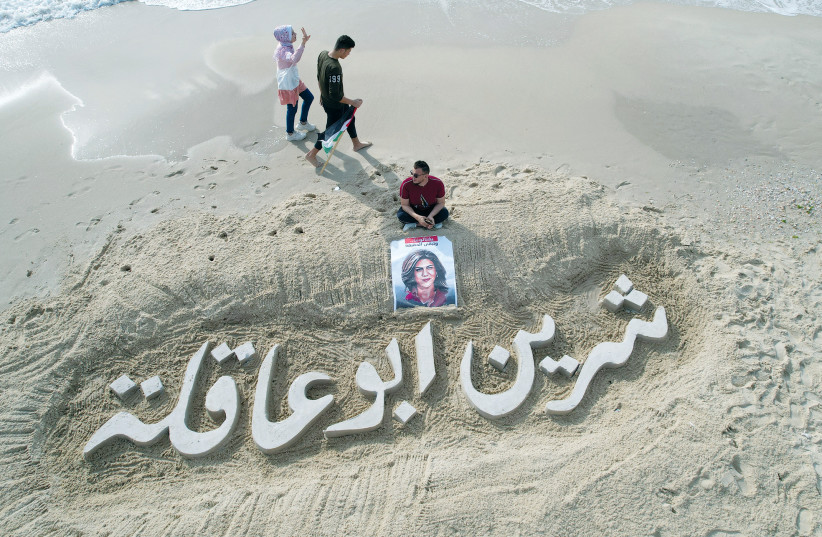Israel has had strategic successes and tactical blunders in arguing over the narrative surrounding the death of Al Jazeera journalist Shireen Abu Akleh, public diplomacy experts say, but it may be a fight in which the best-case scenario is a stalemate.
“You can’t win this, but you can lose this — and they’re not losing,” said Col. (res.) Miri Eisen, who served in the Israeli intelligence community for 20 years and was a government spokesman during the 2006 Second Lebanon War.
Difficult narrative battleground
Former IDF spokesperson Lt. Col. (res) Peter Lerner said the circumstances surrounding Abu Akleh’s death have “all the ingredients of a successful story for the media.” The incident, he said, has visuals and drama that draw attention, and audiences are familiar with Jenin so the story already fits into prior negative narratives about Israel.
Eisen argues that the basic narrative framing is very difficult to overcome because regardless of who fired the bullet, it occurred during IDF operations — and the international media does not support Israel’s right to fight terrorism.
Despite all this, on a broader scale international media is reflective of both [Israeli and Palestinian] sides” of the story, said Lerner.

“The Prime Minister’s office, Defense Ministry and IDF presented a clear and relevant response in line with lessons learned from the past,” said Eisen.
On the strategic level, Israel’s limited success can be attributed to the coordination, timeliness and engagement on traditional and social media.
Public Diplomacy Directorate
“After years of getting used to seeing the world adopt the stories of the Palestinians as absolute truth, we finally have a Public Diplomacy Directorate that does not leave the media stage to the inventions and lies of our enemies,” Prime Minister Naftali Bennett wrote on Instagram, praising the work of the directorate as why Israel has had better messaging during this public relations crisis.
The Public Diplomacy Directorate was reestablished by Bennett’s government in December, with its chief purpose to facilitate the synchronization of Israel’s external messaging. The Israeli position has largely been uniform about the death of Abu Akleh, with some slight variations that officials have walked back or deleted.
Competing narratives
As soon as Abu Akleh was killed in a gun battle in Jenin between IDF soldiers and Palestinian gunmen, two competing narratives emerged.
According the pro-Palestinian position, IDF soldiers deliberately targeted and killed a clearly marked journalist. The pro-Israel position has largely been that while it is possible that the IDF accidentally shot Abu Akleh, it was likely Palestinian gunfire, and therefore an investigation needs to be opened.
“Offering the Palestinians a joint investigation was the proper decision, and the PA’s predictable refusal ought to underscore they have no intention of deducing the truth, but would rather only shamefully and cynically exploit Abu Akleh’s death and this terrible tragedy for political purposes,” said Arsen Ostrovsky, chairman and CEO of The International Legal Forum, and an expert in digital diplomacy.
“I think they made the right call in continuing to request a joint investigation and to even have a credible third party participate,” said Aviva Klompas, cofounder of the new think-tank Boundless.
David Lange, CEO of IsraellyCool, argued that there needed to be even more messaging and reinforcement of Israel’s “commitment to investigate what happened, and willingness to cooperate with the PA in doing so.”
Speedy response
Israel has previously been criticized for its slow response to public relations crisis, such as in December, when a video went viral of a Palestinian terrorist being shot by Border Police officers was portrayed, in the words of Palestinian activist Mohammed El-Kurd, as a “field execution.” While the Israeli response was outdone by Palestinian activists, Israeli public diplomacy experts see the current reaction time positively.
“In instances like this, it immediately becomes a battle of narratives, where timing is absolutely critical,” said Ostrovsky. “Both the Israeli government and the pro-Israel civil society network ought to be commended for their immediate response.”
<br>Tactical failures
Others argue, however, that Israel may have moved too quickly, seizing on talking points that damaged their strategy.
“I feel the Israeli Foreign Ministry was too quick and careless in tweeting out that video of terrorists, while strongly implying they were the ones who shot and killed Shireen Abu Akleh,” said Lange. “This was easy to disprove, as B’tselem illustrated.”
Media analyst Emanuel Miller said “the video the IDF tweeted caused some embarrassment. Journalists very quickly realized it was of a different area, and called it a red herring. Putting it out there was clueless, and made us look like we had something to hide. We didn’t lose the narrative because of these things, but these missteps made it impossible to win it back. It undermined Israel completely, and made Israel look like it was being disingenuous and trying to muddy the waters. Really unnecessary and not well-thought-out at all.”
Lerner feels that one area that Israel needs to improve is the lack of talking heads. Israel was quick to publish press releases and statements, but those aren’t as relevant for live broadcasts and television. According to Lerner, Israel needs to ensure there are representatives speaking on television and other visual media about the necessity of IDF ops and the danger that journalists face in combat zones.
While the Israeli government may have learned its lesson, the Israeli media may not have been as well prepared.
Eisen criticized the media for zealously trying to prove who was right and wrong when there wasn’t enough information — and against the official Israeli narrative that emphasizes a joint investigation.
“It isn’t about winning the war of narratives, it’s about not losing –and those aren’t the same things,” cautioned Eisen.
